Connecting the dots for essential change in research culture
More and more evidence is showing a positive research culture - supportive of difference and diversity - is essential for producing great science. But how best do we achieve that?
Today, bioscience research is increasingly leaning towards the collaborative and interdisciplinary - a way of working which depends on a culture of support and encouragement. But pressures facing researchers mean this can be difficult to achieve at all times.
Traditionally, academia is based around the acquisition of limited resources - funding, permanent positions, publication - and culture can lead to excessive work being seen as a badge of honour.
The majority of top academic positions are still held by white men, with women, disabled people and Black, Asian and minority ethnic groups under-represented.
So how do we make space to value difference and help people from diverse backgrounds feel like they belong, in a culture biased towards white males and designed around competition?
More than 200 people attended the inaugural Connecting Research Culture Conference 2025, hosted by the Earlham Institute on 26 and 27 March, to try and begin to answer this important - and urgent - question.
Dr Siobhan Dorai-Raj, Earlham Institute’s Inclusion, Diversity, Equality and Accessibility (IDEA) manager, was awarded Biotechnology and Biological Sciences Research Council (BBSRC) Connecting Culture funding to lead the organisation of the conference on the Norwich Research Park..
The programme was designed for people from all staff and student cohorts within the research ecosystem. PhD students, technicians, and administrators were represented alongside senior research leaders and funders.
Representatives from the eight BBSRC strategically funded research institutes and research culture leaders from several different funders, universities and wider sectors were all present.
The BBSRC also funded three other projects in the Connecting Culture funding call.
These were: a cross-institute mentoring programme led by Harriet Keep at the Pirbright Institute; a project to understand, value and celebrate neurodiversity, led by Dr Clare Stevenson and Leah Milner-Campbell at the John Innes Centre; and a study to explore and establish mechanisms and best-practice around research culture and EDI evidence and metrics led by Professor Jayne Hope and Dorotea Deshishku at the Roslin Institute.
All three projects were presented at the conference, which aimed to disseminate their findings, share best practice, and to build and support cross-institutional research culture networks.
Professor Neil Hall, Director of the Earlham Institute, welcomed attendees.
“There’s a wide acceptance now that having a research culture which is inclusive, based on equality, and values the contribution of all staff is not just a nice-to-have - it’s essential to a successful research organisation,” he said.
“It’s particularly important we have events like this - not just to share our successes and failures, but also hopefully to inspire each other, have a chance to network and make partnerships with new people, and continuously try and improve on what we do.”
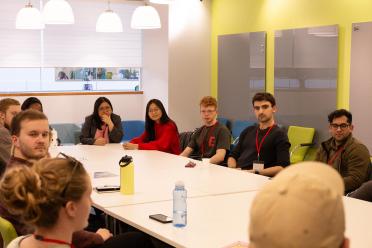
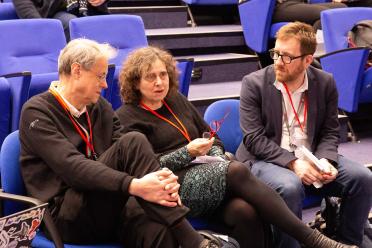
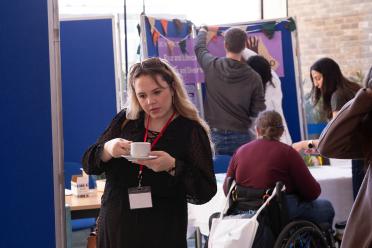
Left: The conference included parallel cohort discussions, enabling peer groups to share and discuss best practice and challenges. Middle: Prof Graham Moore, Director of the John Innes Centre, with Prof Anne Ferguson-Smith, Executive Chair of BBSRC, and Prof Neil Hall, Director of the Earlham Institute. Right: Representatives from different staff support networks were also on hand to discuss their peer support groups.
Professor Anne Ferguson-Smith, Executive Chair for BBSRC, introduced the conference.
“Over the past dozen years or so, prior to taking on this role, I've watched - and been hugely impressed by - the role that UKRI and other funders have played in actively shaping and changing the research culture landscape for the better,” she said.
“We at BBSRC launched this Connecting Culture Fund to benefit our institutes, and encourage a more collaborative approach to identify and use best practice as we go on our research culture journey. And it is a journey. It doesn't have an end. It is an evolving and really important journey for all of us.”
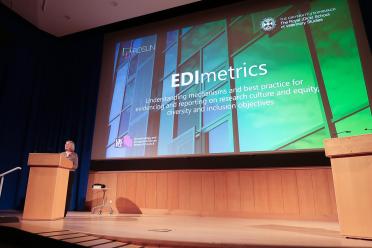
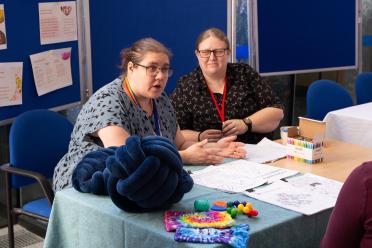
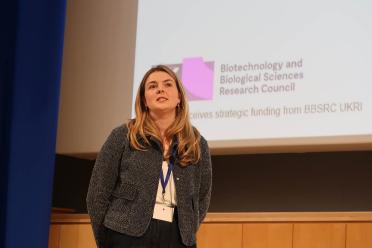
The conference included talks from three BBSRC Institutes about projects they led on as part of the same funding call. Left: Prof Jayne Hope from the Roslin Institute’s presenting work on reporting EDI programmes. Middle: Leah Milner-Campbell, Neurodiversity Project Officer from the John Innes Centre. Right: Harriet Keep from the Pirbright Institute presenting work on a cross-institute mentoring programme.
A key topic at the conference was the question of what makes a “good” research culture.
People working in academic research face sector-specific pressures. These can include the demands of competition for funding, short-term contracts, and the need to relocate more than once to progress their careers.
Coupled with the ordinary pressures of everyday life, this means mental health among academics has nosedived.
Speaker Dr Ireen Litvak-Zur, from Advance HE, cited studies showing the depression rate among graduate students running at more than six times the general population.
“There is a mental health crisis in science. It’s at all career stages and across the world. It's not only in the UK. We see it everywhere,” she said.
She added that studies show rates are highest among transgender and female students, groups which experience discrimination.
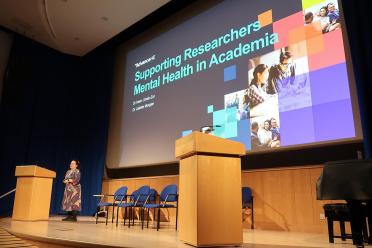
Dr Ireen Litvak-Zur from Advance HE presents her talk on supporting researchers’ mental health in academia.
But is talking enough?
Second-day speaker Steven Fuller, the founder and director of Race in STEM, tackled the challenge of under-representation from Black, Asian and minority ethnic communities.
He noted the dangers of assuming holding a conference would be enough to tackle the issues discussed.
“It’s important to have these conversations, but we don’t want to be having this exact conversation again next year. I would encourage all of you to be intentional and accountable about what you want to achieve,” he said.

Panel discussion speakers Charlotte Bonner-Evans, University of Glasgow, Dr Katie Nicoll Baines, Future Leaders Fellows Development Network, and Steven Fuller, Race in STEM.
The Connecting Research Culture Conference 2025 featured expert talks, panel discussions, and breakout sessions on diverse topics. These included research integrity, defining good research culture, leadership’s role in cultural change, open data, narrative-style CVs and science policy.
Dr Dorai-Raj said she was delighted with the feedback she had received, with attendees calling the conference fun, engaging and a resounding success.
“I’ve received some lovely positive comments – people have said they left feeling energised, informed, connected and excited for the next phases,” she said.
“One of the PhD students who attended said they had never really interacted with anyone from other research institutions before. They told me it was quite enlightening and allowed for a greater understanding and appreciation of our wider research environment.
“I also had some wonderful feedback from someone who led one of the sessions, who said being part of a panel having open and frank discussions about research culture - as well as hearing about fundamental changes to the funding landscape and all the other incredible initiatives taking place - have been genuinely eye-opening for them,” she added.
“While we’ve made significant progress, there is still much more to learn from one another. We hope the conversations sparked at this conference will lead to tangible improvements in research culture.”
She said the Earlham Institute would be sharing more information on the findings of this conference in due course.